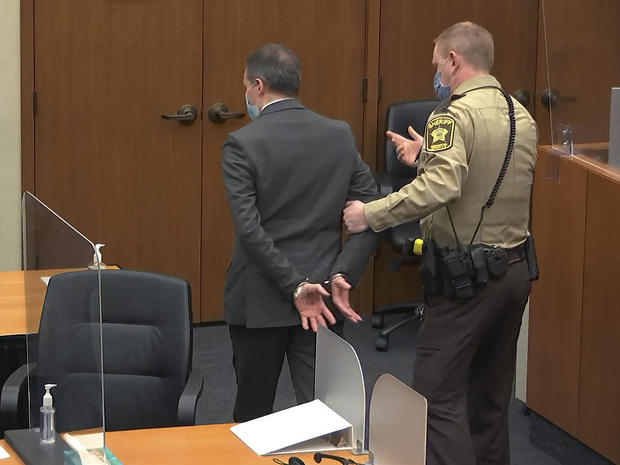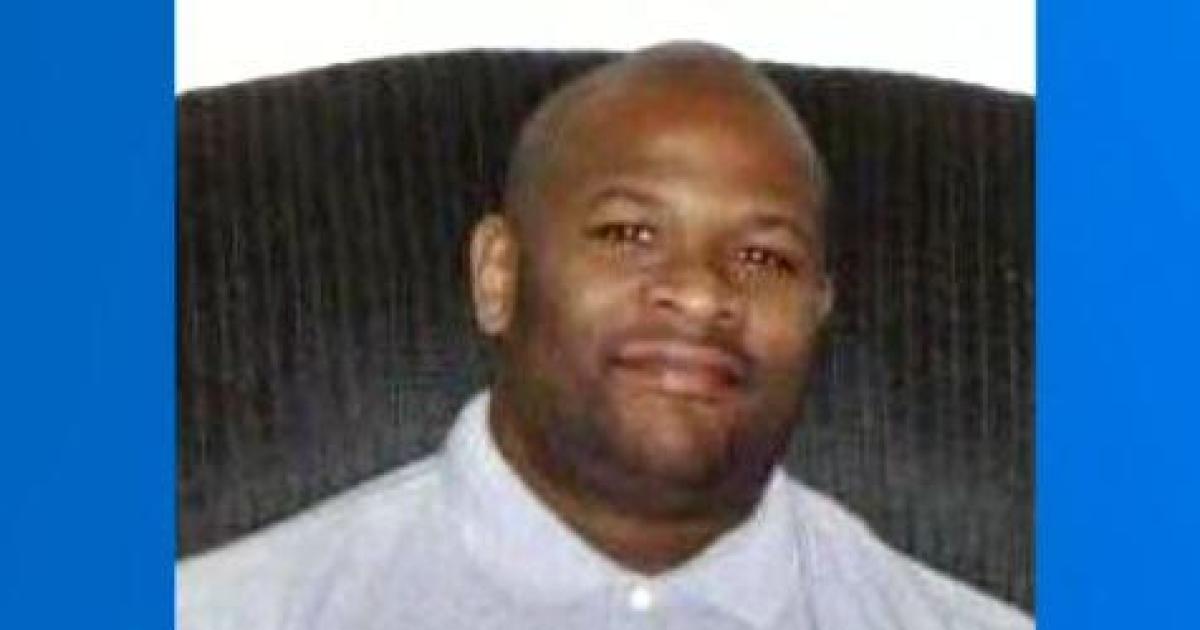Derek Chauvin asks for probation as prosecutors seek 30 years ahead of sentencing
Derek Chauvin asked a judge to sentence him to a term of probation or a shorter prison term than suggested by Minnesota guidelines in a sentencing memorandum filed Wednesday. The memo cites Chauvin's lack of previous criminal history, his previous work as a police officer and the risk he could be victimized in prison as factors the judge should consider as he weighs a sentence.
But in another memorandum filed Wednesday, prosecutors asked for a sentence of 30 years for the convicted former Minneapolis officer, a term they said would "properly account for the profound impact of [Chauvin's] conduct on the victim, the victim's family, and the community."
Chauvin was convicted April 21 of second-degree murder, third-degree murder and second-degree manslaughter in the killing of George Floyd. A jury agreed with prosecutors who said Chauvin caused Floyd's death when he pinned him to the ground with a knee on his neck for more than nine minutes during a May 2020 arrest in Minneapolis.
Chauvin could face up to 40 years in prison when he is sentenced June 25 on the top count of second-degree murder, though Minnesota sentencing guidelines suggest a term of just over 10 and a half years to 15 years in prison.
Last month, Judge Peter Cahill found "aggravating factors" exist that allow for him to sentence Chauvin to a term longer than the suggested 15 years. Cahill agreed with prosecutors that four such factors exist: that Chauvin committed a crime in front of a child, that Chauvin acted with particular cruelty, that he acted as part of a group, and that he abused his position of trust and authority as a police officer.
Cahill found that Chauvin acted with particular cruelty because he killed Floyd slowly despite Floyd's pleas that he couldn't breathe. Floyd was "begging for his life and obviously terrified by the knowledge that he was likely to die" but Chauvin "objectively remained indifferent to Floyd's pleas," Cahill wrote.
Wednesday, prosecutors said the aggravating factors support their recommendation of double the 15-year upper end of the sentencing range, or 30 years. Chauvin, they said, "brutally murdered Mr. Floyd, abusing the authority conferred by his badge."
"His actions traumatized Mr. Floyd's family, the bystanders who watched Mr. Floyd die, and the community. And his conduct shocked the Nation's conscience," the prosecution's memo read. "No sentence can undo the damage [Chauvin's] actions have inflicted. But the sentence the Court imposes must hold [Chauvin] fully accountable for his reprehensible conduct."
But in the defense memo, Chauvin's attorney Eric Nelson asked Cahill to discount his finding that aggravating factors apply, and rule instead that mitigating factors allow either for a term of probation or a shorter sentence than guidelines suggest. Nelson asked the judge to "look beyond" his findings to Chauvin's "background, his lack of criminal history, his amenability to probation, to the unusual facts of this case, and to his being a product of a 'broken' system."
Nelson said that Chauvin has been "painted as a dangerous man," but argued that "behind the politics, Mr. Chauvin is still a human being." He cited Chauvin's 19-year history with the Minneapolis police department, several on-the-job commendations and the support of his family and friends.
"In spite of his mistakes, Mr. Chauvin has demonstrated that he has a capacity for good and that he has the discipline to consistently work toward worthwhile goals," the memo reads.
The defense memo says Chauvin, 44, has been diagnosed with heart damage and that he may be likely to die at a younger age like other ex-law enforcement officers. It also says Chauvin may be more likely to be victimized in prison because he was convicted as a police officer, pointing to the fact that he is being segregated from the general prison population before his sentencing over safety concerns. It also says Chauvin has no previous criminal convictions and complied with pre-trial release conditions and court procedures.
"Throughout these proceedings, and in the face of unparalleled public scorn and scrutiny, Mr. Chauvin has been very respectful to the judicial process, the Court, and the State," the memo said.
Should the judge rule against a probation-only term, Nelson argued that a sentence shorter than the recommended guidelines is warranted because Chauvin was "unaware that he was even committing a crime."
"Mr. Chauvin's offense is best described as an error made in good faith reliance [sic] his own experience as a police officer and the training he had received — not intentional commission of an illegal act," the memo says.
Chauvin's defense team in a separate filing Wednesday also detailed their arguments for why they believe Chauvin should receive a new trial, alleging a series of errors on the part of the judge and prosecutors and citing massive pre-trial publicity.
As he weighs the sentence, Judge Cahill will consider the recommendations from both teams, along with a pre-sentencing investigation, or PSI, report prepared by the Department of Corrections. The PSI will include an assessment of Chauvin to identify his risk of re-offending and other factors the judge can consider as he weighs a sentence, including "the defendant's individual characteristics, circumstances, needs, potentialities, criminal record and social history, the circumstances of the offense and the harm caused by it to others and to the community." The document is not expected to be made public.
The report will also include victim impact statements, accounts written by victims or relatives to express the impact the crime has had on their lives. The judge will also weigh those statements in determining a sentence. Typically, people who provide those statements are allowed the chance to read them in court at the sentencing hearing, if they choose.
Chauvin and the three other fired Minneapolis officers are also facing federal civil rights charges in Floyd's death, though it's not clear when that trial will take place. The trial of the other three officers — Tou Thao, J. Alexander Kueng and Thomas Lane — on state charges is currently scheduled for March 2022.






